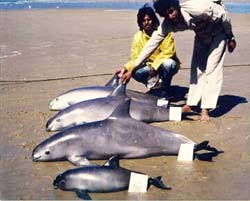
Defying ocean’s end offers global perspective on eve of pew report
For the first time ever, the world’s largest environmental organizations, working with scientists, the business community and international governments, met specifically to develop a comprehensive and achievable agenda to reverse the decline in health of the world’s ocean.
The five-day Defying Ocean’s End (DOE) conference marked the launch of a new, science-based international effort to restore and maintain

Oxford scientists are using the latest virtual reality technology to study how we perceive the world in 3D. The “immersive virtual reality” used by the Virtual Reality Research Group at Oxford University allows subjects to walk around or look up and down while what they see through a headset changes accordingly – they can explore the virtual environment by literally walking around. Meanwhile, the scientists monitor how they are perceiving the dimensions of their ‘Matrix’-style world.
The res

Car owners of the future could one day swap petrol for environmentally-friendly alternatives, thanks to a multi-million pound research project involving academics at The University of Nottingham.
Researchers from the University’s School of Chemistry and School of Mechanical, Materials, Manufacturing Engineering and Management are developing new materials for hydrogen storage and for use in fuel cells that can use hydrogen as a clean alternative to oil and natural gas.
If new ma

A research study at The University of Nottingham looking at how growth can contribute to spontaneous childhood cancer regression could lead to more effective ways of treating tumours.
The one-year project, led by Christopher Jones in the School of Nursing in collaboration with Dr Michael Symonds in the Division of Child Health and Dr David Walker at the University’s Children’s Brain Tumour Research Centre, will look at whether growth hormone plays a part in tumours spontaneously ge

Academics at The University of Nottingham are developing new nanotechnology that could be used to treat brain tumours more effectively by reducing the serious side-effects associated with anti-cancer drugs.
A team led by Dr Martin Garnett in the School of Pharmaceutical Sciences has been awarded a £206,000 grant from the Biotechnology and Biological Sciences Research Council to continue investigations on the preparation of nanoparticles for delivering drugs to brain tumours.
Anti-c

Authors of a study published on THE LANCET’S website today (www.thelancet.com) highlight how statins (cholesterol-lowering drugs) could offer protection against cardiovascular disease for people who have undergone kidney transplantation.
Kidney-transplant patients are at an increased risk of premature cardiovascular disease; many transplant recipients have pre-existing cardiovascular disease at the time of transplantation and immunosuppressive therapy may aggravate existing risk factors or p

– new calculation confirms standard model of particle physics. Contribution of hadronic vacuum polarization determined with unprecedented accuracy. The magnetic moment of the muon is an important precision parameter for…
Technique may prevent formation of unwanted waves that siphon off needed energy. Heating plasma to the ultra-high temperatures needed for fusion reactions requires more than turning the dial on a…

An international team of astronomers, led by researchers from the Astronomical Observatory of the University of Warsaw, have identified a new class of cosmic X-ray sources. The findings have been…

How deubiquitinases USP53 and USP54 cleave long polyubiquitin chains and how the former is linked to liver disease in children. Deubiquitinases (DUBs) are enzymes used by cells to trim protein…

Conceptual blueprint to analyze experimental catalyst data. Machine learning (ML) models have recently become popular in the field of heterogeneous catalyst design. The inherent complexity of the interactions between catalyst…

Antibody that Neutralizes Inhibitory Factors Involved in Nerve Regeneration Leads to Enhanced Motor Function after Acute Spinal Cord Injury. Researchers at 13 clinics in Germany, Switzerland, the Czech Republic and…

How simulations help manufacturing of modern displays. Modern materials must be recyclable and sustainable. Consumer electronics is no exception, with organic light-emitting diodes (OLEDs) taking over modern televisions and portable…

“Neurons that fire together, wire together” describes the neural plasticity seen in human brains, but neurons grown in a dish don’t seem to follow these rules. Neurons that are cultured…

The quest for sustainable energy solutions has been a major focus of scientific research for decades. Solar energy, a clean and renewable source, has emerged as a promising alternative to…

With a processing speed a billion times faster than nature, chip-based laser neuron could help advance AI tasks such as pattern recognition and sequence prediction. Researchers have developed a laser-based…

New technology could remotely identify various types of plastics, offering a valuable tool for future monitoring and analysis of oceanic plastic pollution. Researchers have developed a new hyperspectral Raman imaging…

Artificial Intelligence (AI) has established a strong presence across industries, large and small. The “VoBaKI” research project has empowered small and medium-sized enterprises (SMEs) with an innovative tool to independently…